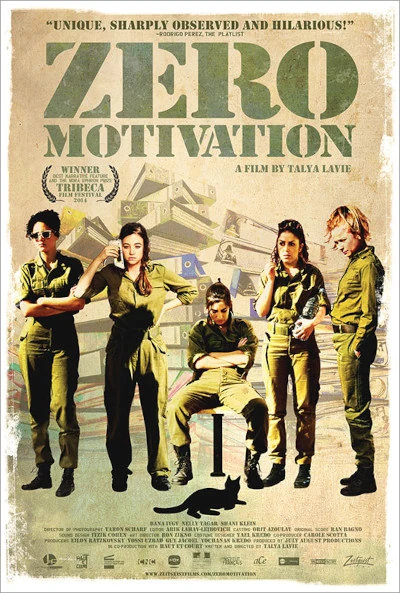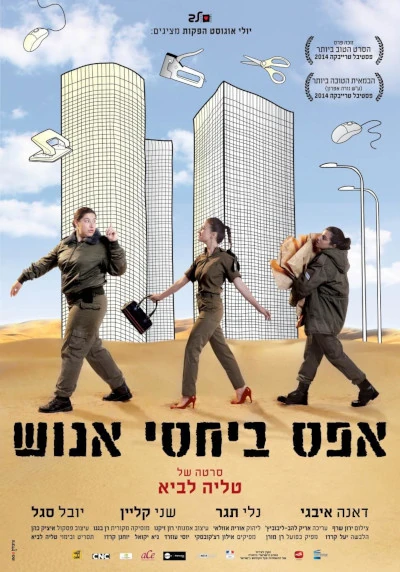אפס ביחסי אנוש
Zero Motivation (2014)

I am aware that there may well be people who were initially drawn to this blog by a list of Palestinian films, and who then after a couple of taps or clicks have found themselves looking at a post about a film depicting life in the Israeli army (which I’ll refer to henceforth as the IDF - short for Israel Defence Force of course). Some of those people who land here unknowingly will immediately leave in a big disgusted huff, but hopefully a few will linger on this page and give me a chance here.
This film is going to be a lot less like watching Charles Bronson in Raid on Entebbe, Tom Hanks in Saving Private Ryan, or Brad Pitt in Inglorious Basterds - and a lot more like watching Alicia Silverstone in Clueless (insert your own, more updated teenage high school movie reference if that one doesn’t resonate for you). In other words, I’m easing you in gently here. There are going to be films that are a lot tougher than this one!
I’m pairing this movie with Wajib, a simple tale of one day in the life of a Palestinian father and his son in Nazareth (in the north of the country, of course). The two films came together in my mind because they both concern citizens of this State who are wrestling with confinement - Christian Arab Israeli men in the case of Wajib, and Jewish Israeli women here - going about what is in both cases an essentially humdrum and often tedious existence; but when you pause either movie for a second and think, nothing is normal in either case. In Wajib Abu Shadi (Shadi Senior) and Shadi Junior are confined to their small world of family connections (and their duties - “Duty” is the title of the movie), and it’s very clear how hard it is for them to move out from that small circle and to transcend their reduced status in Israel compared to Jewish citizens. Shadi Jr. has decided that the only way for him to make anything of himself is to leave the country.

Meanwhile, the Jewish Israelis in this movie are also confined….. to…. barracks! The setting is an IDF base in the desert - presumably somewhere in the Negev (where else could it be?) The Negev is pretty big, so that doesn’t really narrow it down so much. I didn’t notice any location ever particularly mentioned when I watched the film, but it really doesn’t matter. The point is of course that the protagonists are young people thrown together on an army base in the middle of nowhere. There’s nothing to do in your free time, and even while you’re working it’s hard to perceive exactly what you’re contributing to Israel’s national security. They have a name for this in Israel. People who spend the majority of their two years (in the case of women, if I remember correctly) or three years (for men) serving in the IDF’s bureaucracy, without any significant experience in the Occupied Territories or at border checkpoints, are known as jobniks (ג’ובניקים). It’s not necessarily a matter of skiving or shirking - simply that in the quieter moments (the time of writing is not one of those moments, obviously) not everyone needs to be in action, and ultimately the IDF is just like any other large organisation which needs people to do the boring desk jobs that don’t make the headlines. Of course I’m also sure that it’s easier to get yourself a better job if you (or your family) know which strings to pull, and one of the main protagonists in this film, Daffi (played by " target="_blank" rel="noopener noreferrer">Nelly Tagar, is dreaming of getting herself transferred to a job in Tel Aviv, where boredom need not ever be an issue (in her dreams at least).
Just as the Palestinian father and son in Wajib never interact verbally with a single Jewish Israeli in the course of that film (although one in particular is mentioned but never seen), similarly we never meet an Arab in this film. The protagonists are serving in the bureaucracy of an army which they can’t avoid (there are very definite medium- and long-term negative consequences for refusing to serve), opposing an enemy that is never seen. We’re in a bubble here - a very boring, dry and dusty bubble. Daffi’s best friend is Zohar (" target="_blank" rel="noopener noreferrer">Dana Ivgy, who spends the majority of her time in the office playing Minesweeper, and winding up their uptight boss Rama, who is clearly ambitious to move up the ranks but struggling to get very far in a macho male-dominated environment. So far it sounds so very very boring, right? Well, I obviously got through a hundred minutes of it, so it can’t be all that boring, unless I’ve got a boredom threshold similar to what you’d need to survive on that base.
I digress - look, there are several good storylines, very loosely connected, including one in the first half hour which actually comes as a bit of a shock. There’s a lot of comment about the status of women in Israeli society (in the age of trigger warnings, be aware that there is some sexual violence); about the transition from childhood to adulthood, which of course takes place in university for middle class Westerners but in military service for most Israelis; and there’s a fair bit of toxic masculinity to chew on (and spit out!). The comedy is sometimes dark to the point of nihilistic, sometimes surreal, and more often than not it is both at once. Step back and squint from a distance at life on this military base, and it’s all a bit mad, eh. The more sensitive characters appear to cultivate an augmented sense of the absurd, and to engage directly with that in order to transcend the built-in lunacy of their situation. If I was veering off into pretentiosity, I could say that it’s a bit existentialist. But since I’ve never read Heidegger or Sartre, and my only understanding of what that means comes from French films of the sixties, I’ll step back from that intellectual mantrap.
It’s not an anti-war film in a narrow sense, because there’s no war shown here for us to criticise, apart from the warring cliques in the office and the war of emotional attrition between Zohar and Rama. There are no heart-breaking scenes of loss in which we grieve over the futility of war (apart from the shock which I already mentioned, I suppose, but that’s nothing to do with falling in combat, and anyway no spoilers!) There’s no glamour, and certainly no romanticisation of the life of the soldier. It is a film that does question the absurdity of the need for armies to exist in the first place, and certainly with regard to armies in which everyone is compelled to serve. But none of this is achieved by hammering a manifesto up on a door - all that’s needed is to point out the absurdity of it all. There’s no investigation of the brutal dilemma facing a previously persecuted and subjugated people who have now become the oppressors; and no potential two-state, one-state or no-state solutions are offered. That’s politics, and politics are far away from the lives of these young people in the desert, who just are where they are, doing what they’re doing (or more often not doing), and counting down the days to discharge, where the “rest” of their normal life awaits.
